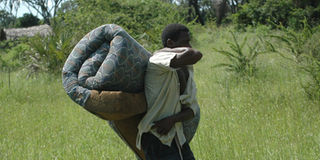Mpeketoni was a ripe target for terror attack

A resident of Mporomoko village near Mpeketoni leaves after nine more people were killed on June 16, 2014 following last Sunday’s massacre. In Kenya, a section of the coastal religious and political leadership seems to have made it their forte to protect prowling terror gangs. PHOTO | FILE
What you need to know:
- Report said anger over settlement scheme was the cause of tension in the area
- Mpeketoni is a rural outpost, and the majority of residents are the beneficiaries of founding President Jomo Kenyatta’s plan to set up a settlement scheme in the area.
Carpenters were fixing the broken doors on Ann Gicheni’s grocery shop in Mpeketoni on Tuesday morning when they noticed some writings on a Safaricom poster stuck on the door.
Under some Arabic script was the phrase “Asiyefundishwa na Westgate atafunzwa na …” The Swahili proverb from which that was coined says “Asiyefunzwa na mamaye hufunzwa na ulimwengu” (If you don’t learn from your mother, you will learn from the world).
The shopkeeper was certain that because she had not seen the message on the poster before, it had been written on Sunday night by the men who broke into the shop and carted away some of her stock.
Ms Gicheni lost a 50-kg bag of sugar, two boxes of spaghetti, one bale of maize flour, two 50-kg bags of rice, bottles of cooking oil and juices. Some other provisions were burnt in the fire they lit after looting but which was put out by neighbours, who broke down the back door to get into the shop.
This act of stocking up on provisions, the scribbling on the poster with the reference to the Westgate attack and descriptions of the attackers and the nature and style of the attacks are some of the tell-tale signs that lend credence to the assertion that the attackers were not a rag tag army of locals acting on a purely political motive.
Many of those interviewed and who saw the attackers spoke of seeing at least one group led by a tall, light-skinned man, who walked at the front and carried a superior weapon that when fired at a vehicle could set it alight.
President Uhuru Kenyatta said in a recorded message to Kenyans that the attack was a “well planned, orchestrated and politically motivated ethnic violence against a Kenyan community.”
He chose to adopt the position that the attack was carried out “with the intention of profiling and evicting them for political reasons” and suggested that statements made at rallies, the last one in Mombasa, motivated the attacks.
MORE THAN MEETS THE EYE
“The sum total of these campaigns is to portray certain people as less human and, therefore, less deserving of compassion and consideration, and perhaps, fair game for brutality,” said Mr Kenyatta.
But there were also signs that the leaders, planners and inspirational figures behind the attacks might have used more than mere politics to get local help.
Mpeketoni is a rural outpost, and the majority of residents are the beneficiaries of founding President Jomo Kenyatta’s plan to set up a settlement scheme in the area.
Taken from places such as Saa Mbaya village near Kahawa West and parts of the Rift Valley, they eventually cleared the land, chased away the baboons and other wild animals and settled there.
According to the report of the Truth, Justice and Reconciliation Commission, the settlement was “unprocedural, dubious, and irregular” and the anger over it was the cause of tensions there.
Only 20 per cent of the indigenous Coastal communities got any of the land. The locals say that when they asked President Jomo Kenyatta to bring them tractors to till the land, he brought the landless from the north.
Mpeketoni thus became a thriving rural outpost dominated by a community brought there from far in the interior whose customs and religion were different from those of its neighbours.
It also didn’t help that they were settled on disputed land. The uncultivated areas are forested while the drier parts are scrubland.




